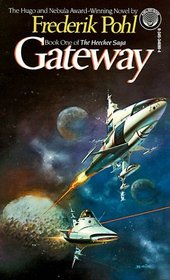Helpful Score: 2
Picked this up because it's one of those 'classics' of SF that I'd never got around to reading, even though I've seen it around on bookshelves for practically my whole life. (Just went to check, it was published in 1977.)
The writing style is very typical of the 70's, and also, was not really what I was expecting. For some reason, I was thinking the book would be space opera/adventure - possibly because I was aware that it had several sequels, and the phrase "The Heechee Saga" just sounds kind of silly and space-operatic.
However, the book was very very dark and quite depressing.
The narrator, Robinette (Bob) Broadhead, is a wealthy man, but a disturbed and depressed one, in constant therapy with an AI machine which he has serious resentment toward.
He talks to the AI about his life, which is empty of real meaning or deep relationships - and the AI gradually gets him to reveal his story to the readers.
On a badly overpopulated earth which, depleted of resources, the narrator worked in food mines - a dangerous and low-paying job. When he wins a lottery, he takes a ticket to Gateway.
Gateway is a station created by a mysterious race of absent aliens, known as the Heechee. The Heechee left behind a large number of spaceships on Gateway - which run on autopilot to unknown destinations. Sometimes these destinations hold fabulous alien treasures which make their finders wealthy beyond imagining. More often the space explorers don't make it back alive.
Gateway tells the story of Broadhead's mission - and how he was emotionally scarred for life.
Although this book won the Hugo, Nebula, and Campbell awards, I didn't like it enough to get the sequels.
The writing style is very typical of the 70's, and also, was not really what I was expecting. For some reason, I was thinking the book would be space opera/adventure - possibly because I was aware that it had several sequels, and the phrase "The Heechee Saga" just sounds kind of silly and space-operatic.
However, the book was very very dark and quite depressing.
The narrator, Robinette (Bob) Broadhead, is a wealthy man, but a disturbed and depressed one, in constant therapy with an AI machine which he has serious resentment toward.
He talks to the AI about his life, which is empty of real meaning or deep relationships - and the AI gradually gets him to reveal his story to the readers.
On a badly overpopulated earth which, depleted of resources, the narrator worked in food mines - a dangerous and low-paying job. When he wins a lottery, he takes a ticket to Gateway.
Gateway is a station created by a mysterious race of absent aliens, known as the Heechee. The Heechee left behind a large number of spaceships on Gateway - which run on autopilot to unknown destinations. Sometimes these destinations hold fabulous alien treasures which make their finders wealthy beyond imagining. More often the space explorers don't make it back alive.
Gateway tells the story of Broadhead's mission - and how he was emotionally scarred for life.
Although this book won the Hugo, Nebula, and Campbell awards, I didn't like it enough to get the sequels.
Excellent Sci Fi.
1st book of Heechee saga
Great science fiction has always been full of biting social commentary, and Pohl has consistently been one of the most insightful critics. Many of his greatest novels center around the capitalist system and how it exploits the workers' hopes and dreams -- and how peoples' hopes and dreams propel them to take the ultimate chances, even venturing out into the dark reaches of space to risk their very lives on a slim chance that they might become rich.
I agree that some of the later books in this series are not half as strong as this novel, and the character of Robinette Broadhead is annoying to many. But this book is a true classic and a staple on "top 50 sci fi novel" lists.
I would also suggest "The Space Merchants" as another memorable Pohl book to check out.
I agree that some of the later books in this series are not half as strong as this novel, and the character of Robinette Broadhead is annoying to many. But this book is a true classic and a staple on "top 50 sci fi novel" lists.
I would also suggest "The Space Merchants" as another memorable Pohl book to check out.
A good sci-fi read.
Clever and intriguing. This novel won both a Hugo and Nebula award.
Lots of great short sci-fi stories in here. Was very helpful and fun for my Sci-fi class.




